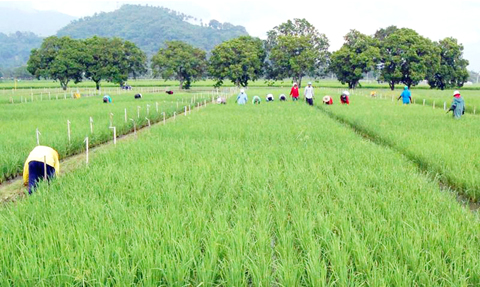The mobile phone may soon replace the centuries-old straw hat as the Filipino rice farmer’s must-have accessory.
Already responsible for helping to topple a government in the Southeast Asian archipelago, mobile phone text messaging could now help launch a neat little agricultural revolution.
“Precision agriculture could become available to small-scale farmers at their fingertips within a few minutes,” says Roland Buresh of the International Rice Research Institute (IRRI).

PHOTO: AFP
The institute develops new rice varieties and crop management techniques aimed at reducing poverty and ensuring that rice production is sustainable, has minimal environmental impact and can cope with climate change.
The non-profit organization, which has its headquarters at Los Banos near the Philiipines capital Manila, now hopes to harness the country’s cellphone mania to bring cutting edge techniques to an ancient system.
The Philippines has been called the texting capital of the world, with some 70 million mobile phone users sending up to 300 million messages a day.
In 2001, texting was credited with helping topple then-Philippine president Joseph Estrada when it was used to bring tens of thousands of demonstrators onto the streets in protest over corruption.
From this month, IRRI scientists led by Buresh plan to use text messaging to send precise management advice and fertilizer recommendations to local farmers by Interactive Voice Response (IVR).
All the farmer has to do is dial a number on their mobile phone, toll free. An automated voice message will then ask him a series of questions to which they should respond by pressing a number on the phone keypad.
Once they have answered all the questions they will receive a text message with recommendations on the amounts, sources and timings of fertilizer applications for his specific rice paddy.
The automated voice recording is available in English and Tagalog and asks questions about the season, size of field, harvesting times and water supply.
Project scientist Rowena Castillo says small-scale Philippines rice farmers have relied mainly on a trial-and-error approach to crop management.
“In the past they’ve asked technicians [for advice] and [learnt from] their own experience,” Castillo said in an interview.
But rice farmers are seldom visited by agricultural technicians, Castillo said, while information via a text message can reach even the most remote farmers immediately and directly.
Although Castillo thinks many young Filipino farmers are already relatively tech-savvy, she admits that the older generation may struggle a bit with the IVR technology.
“Sometimes farmers are hesitant to use [the program], especially old farmers, because they are not used to cellphones, but their sons and daughters could help them,” she said.
However, during initial trials of the program, most feedback from the farmers had been positive, Castillo said.
“Most of them are very enthusiastic because they said that instead of asking the technicians they would use their phones,” she said.
Rice is the staple food of the Philippines but the country is not self-sufficient and last year it was the world’s largest importer of the grain.

AIR SUPPORT: The Ministry of National Defense thanked the US for the delivery, adding that it was an indicator of the White House’s commitment to the Taiwan Relations Act Deputy Minister of National Defense Po Horng-huei (柏鴻輝) and Representative to the US Alexander Yui on Friday attended a delivery ceremony for the first of Taiwan’s long-awaited 66 F-16C/D Block 70 jets at a Lockheed Martin Corp factory in Greenville, South Carolina. “We are so proud to be the global home of the F-16 and to support Taiwan’s air defense capabilities,” US Representative William Timmons wrote on X, alongside a photograph of Taiwanese and US officials at the event. The F-16C/D Block 70 jets Taiwan ordered have the same capabilities as aircraft that had been upgraded to F-16Vs. The batch of Lockheed Martin

GRIDLOCK: The National Fire Agency’s Special Search and Rescue team is on standby to travel to the countries to help out with the rescue effort A powerful earthquake rocked Myanmar and neighboring Thailand yesterday, killing at least three people in Bangkok and burying dozens when a high-rise building under construction collapsed. Footage shared on social media from Myanmar’s second-largest city showed widespread destruction, raising fears that many were trapped under the rubble or killed. The magnitude 7.7 earthquake, with an epicenter near Mandalay in Myanmar, struck at midday and was followed by a strong magnitude 6.4 aftershock. The extent of death, injury and destruction — especially in Myanmar, which is embroiled in a civil war and where information is tightly controlled at the best of times —

China's military today said it began joint army, navy and rocket force exercises around Taiwan to "serve as a stern warning and powerful deterrent against Taiwanese independence," calling President William Lai (賴清德) a "parasite." The exercises come after Lai called Beijing a "foreign hostile force" last month. More than 10 Chinese military ships approached close to Taiwan's 24 nautical mile (44.4km) contiguous zone this morning and Taiwan sent its own warships to respond, two senior Taiwanese officials said. Taiwan has not yet detected any live fire by the Chinese military so far, one of the officials said. The drills took place after US Secretary

THUGGISH BEHAVIOR: Encouraging people to report independence supporters is another intimidation tactic that threatens cross-strait peace, the state department said China setting up an online system for reporting “Taiwanese independence” advocates is an “irresponsible and reprehensible” act, a US government spokesperson said on Friday. “China’s call for private individuals to report on alleged ‘persecution or suppression’ by supposed ‘Taiwan independence henchmen and accomplices’ is irresponsible and reprehensible,” an unnamed US Department of State spokesperson told the Central News Agency in an e-mail. The move is part of Beijing’s “intimidation campaign” against Taiwan and its supporters, and is “threatening free speech around the world, destabilizing the Indo-Pacific region, and deliberately eroding the cross-strait status quo,” the spokesperson said. The Chinese Communist Party’s “threats